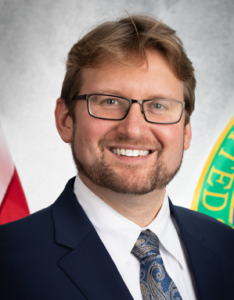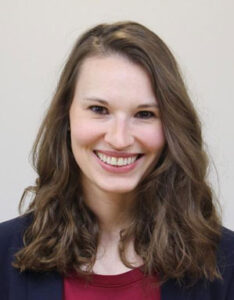Leadership

Brian Anderson, Ph.D.
Executive Director, The Interagency Working Group on Coal and Power Plant Communities and Economic Revitalization
Senior Advisor on Energy Communities, U.S. Department of Energy
Brian J. Anderson, Ph.D., serves as senior advisor to the Under Secretary for Infrastructure in the U.S. Department of Energy (DOE) and is the executive director of the Interagency Working Group on Coal and Power Plant Communities and Economic Revitalization (Energy Communities IWG). A native and longtime West Virginian, Anderson brings extensive expertise and a network of contacts in regional innovation, technology advancements and workforce development for the fossil energy sector.
In his dual roles, Anderson offers technical advice and strategically leverages DOE’s resources and expertise — along with those of a nearly a dozen federal agencies — to reduce barriers, increase efficiencies and raise awareness about resources to drive billions of dollars in competitive funding opportunities and tax credits to coal, oil and gas, and power plant communities. Led by priorities set forth by workers and leaders in their respective local areas, such efforts are helping to drive economic revitalization work in Appalachia and across the nation. In the past three years, the Energy Communities IWG facilitated more than $54 billion in federal awards and loans to America’s energy communities. During this same period, the private sector announced investments of approximately $315 billion in fossil energy communities.
Anderson previously served as director of DOE’s National Energy Technology Laboratory (NETL) from 2018 to 2023. In that role, he advanced NETL’s mission to enable domestic coal, natural gas and oil to economically power our nation’s homes, industries, businesses and transportation, while safeguarding our environment and strengthening America’s energy independence. He was also responsible for NETL’s project portfolio, including research and development (R&D) conducted through partnerships, cooperative research and development agreements (CRADAs), financial assistance, and contractual arrangements with universities and the private sector. In 2021, he was recognized as the Federal Laboratory Consortium National Laboratory Director of the Year.
Prior to joining DOE, Anderson served as director of West Virginia University’s (WVU) Energy Institute, where he coordinated and promoted university-wide energy research in engineering, science, technology and policy. Anderson earned his bachelor’s degree in chemical engineering at WVU and his master’s and doctorate in chemical engineering from the Massachusetts Institute of Technology.

Briggs White, Ph.D.
Advisor to the Office of the Director, National Energy Technology Laboratory (NETL)
Deputy Executive Director, The Interagency Working Group on Coal and Power Plant Communities and Economic Revitalization
Briggs White, Ph.D., serves as deputy executive director of the Interagency Working Group on Coal and Power Plant Communities and Economic Revitalization (Energy Communities IWG). He works with a nearly a dozen federal agencies to listen to the needs of energy community stakeholders and coordinate responsive actions, policy, communications and funding resources. He builds partnerships with academia, nonprofits, philanthropy, states and the private sector to catalyze investments that are responsive to local priorities. In the past three years, the Energy Communities IWG guided more than $54 billion in award selections to America’s energy communities. During this same period, the private sector announced investments of approximately $315 billion in energy communities. White played a central role in establishing a partnership with AmeriCorps to build local capacity in distressed energy communities.
White joined the U.S. Department of Energy’s (DOE) National Energy Technology Laboratory (NETL) in 2007 and has served various roles in program and project management supporting the Office of Fossil Energy and Carbon Management (FECM). Research and development (R&D) projects and programs that White led include coal and natural gas power generation, hydrogen, artificial intelligence, workforce, supply chain development, high-performance materials, water management, and energy storage.
Based out of NETL’s Pittsburgh, Pennsylvania, site, White worked at NETL’s Morgantown, West Virginia, site from 2007 to 2014. He holds degrees in materials science and engineering from Alfred University (B.S.), the University of Florida (M.S., Ph.D.) and the University of Rome (Ph.D.), with an emphasis on solid-state, high-temperature electrochemical devices.

Genna Patton
Engagement Manager, The Interagency Working Group on Coal and Power Plant Communities and Economic Revitalization
Physical Scientist, National Energy Technology Laboratory
Genna Patton serves as engagement manager for the Interagency Working Group on Coal and Power Plant Communities and Economic Revitalization (Energy Communities IWG). She manages and provides strategic direction for the seven Rapid Response Teams (RRTs) established by the Energy Communities IWG in priority energy community regions across the nation. Patton supports RRT efforts to successfully drive resources to communities to meet their needs and helps to build networks of diverse partners in energy communities that work in tandem to achieve economic diversification goals.
Prior to joining the U.S. Department of Energy’s National Energy Technology Laboratory, Patton spent two years in the Office of Policy (OP) at the U.S. Environmental Protection Agency (EPA). There, she focused her efforts on reducing barriers to accessing EPA opportunities through the coordination and implementation of policies and resources supporting community resilience. Within OP, Patton led EPA’s Energy Communities IWG Technical Assistance Pilot. Among other activities, this included providing planning support to two energy communities through a two-day workshop that brought together community leaders and local, state, Tribal and federal government representatives to develop an action plan promoting economic revitalization. She also conducted scoping and engagement for the establishment of new RRTs and coordinated and supported established RRT leads in their workplan development and implementation.
Patton spent more than 12 years as a researcher and policy analyst, leading initiatives and growing coalitions to advance scientific integrity and science-based environmental solutions at nonprofit organizations, including at the Center for Science and Democracy at the Union of Concerned Scientists. She holds a bachelor's degree in biology and a master's degree in environmental policy design from Lehigh University.

Erin Taylor
State Liaison, The Interagency Working Group on Coal and Power Plant Communities and Economic Revitalization
Program Manager, U.S. Department of Energy
As state liaison for the Interagency Working Group on Coal and Power Plant Communities and Economic Revitalization (Energy Communities IWG), Erin Taylor communicates and coordinates with state government offices and other stakeholders to support their unique resources and energy goals. A nationally recognized expert in energy planning, environmental regulation, stakeholder engagement and more, Taylor also serves at the U.S. Department of Energy, Office of State and Community Energy Programs (SCEP). In her role of program manager of the State Energy Program, she oversees the deployment of large-scale technical assistance initiatives and special projects for governments in all 56 states, territories and the District of Columbia — including the implementation of the new mandatory State Energy Office requirement to perform transmission and distribution planning support activities.
Taylor previously held senior roles at the New Mexico Energy, Minerals and Natural Resource Department, supporting the State Energy Office and Mining and Minerals Office. As the State Energy Office deputy division director, she directed the deployment of federal energy funding and oversaw complex regulatory and compliance issues as they related to new transmission development and the decommissioning of legacy energy sites. Throughout her career, Taylor has developed and utilized her deep understanding of environmental protection and sustainability, working on diverse projects such as abandoned mine lands, energy resilience, grid modernization and more.
Taylor holds a bachelor’s degree in economics from Pennsylvania State University, a postgraduate diploma in sustainable rural development from the University of Aberdeen, and a master’s degree in environmental policy and management from the University of Denver

 )
or https:// means you’ve safely connected to
the .gov website. Share sensitive information only on official,
secure websites.
)
or https:// means you’ve safely connected to
the .gov website. Share sensitive information only on official,
secure websites.
